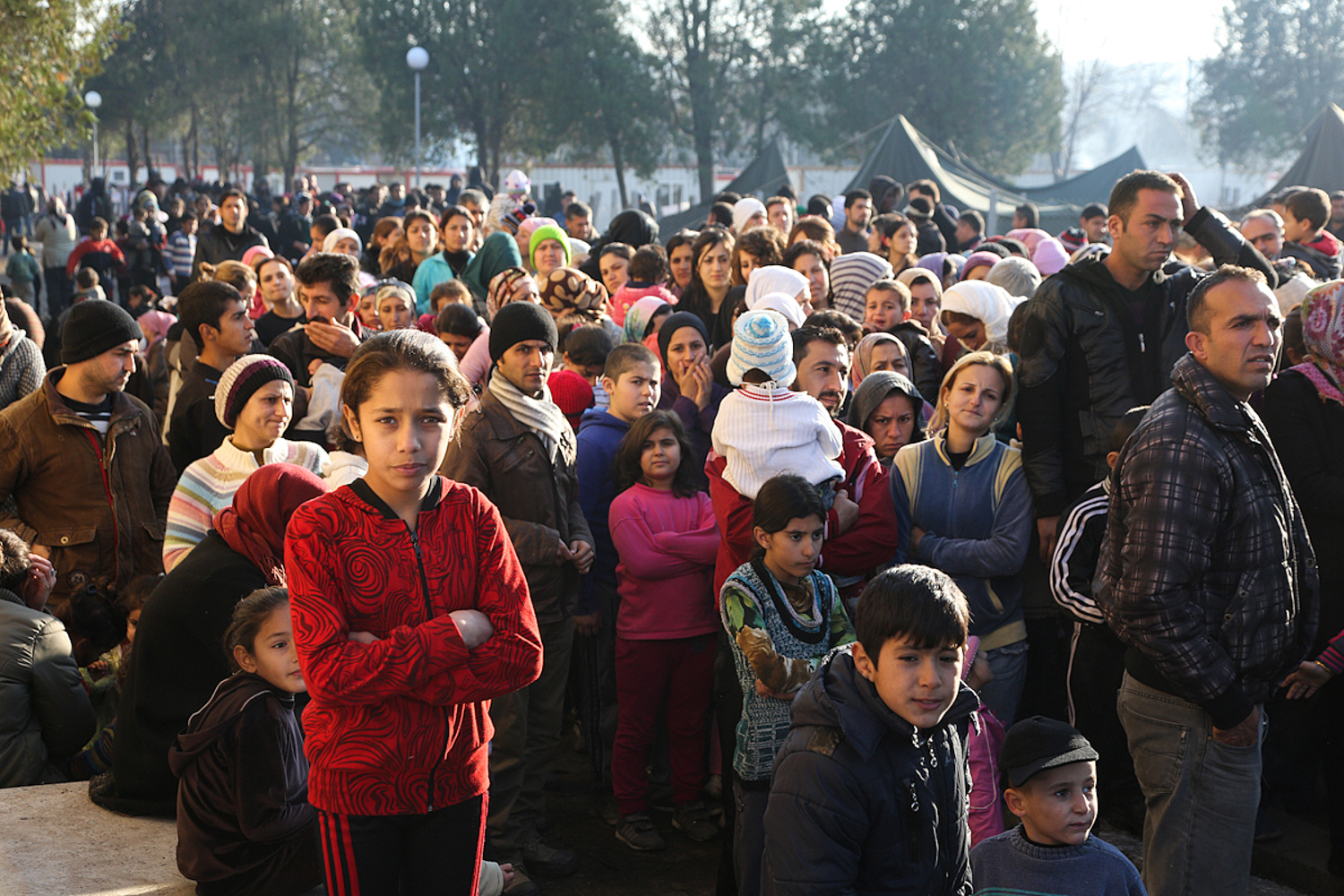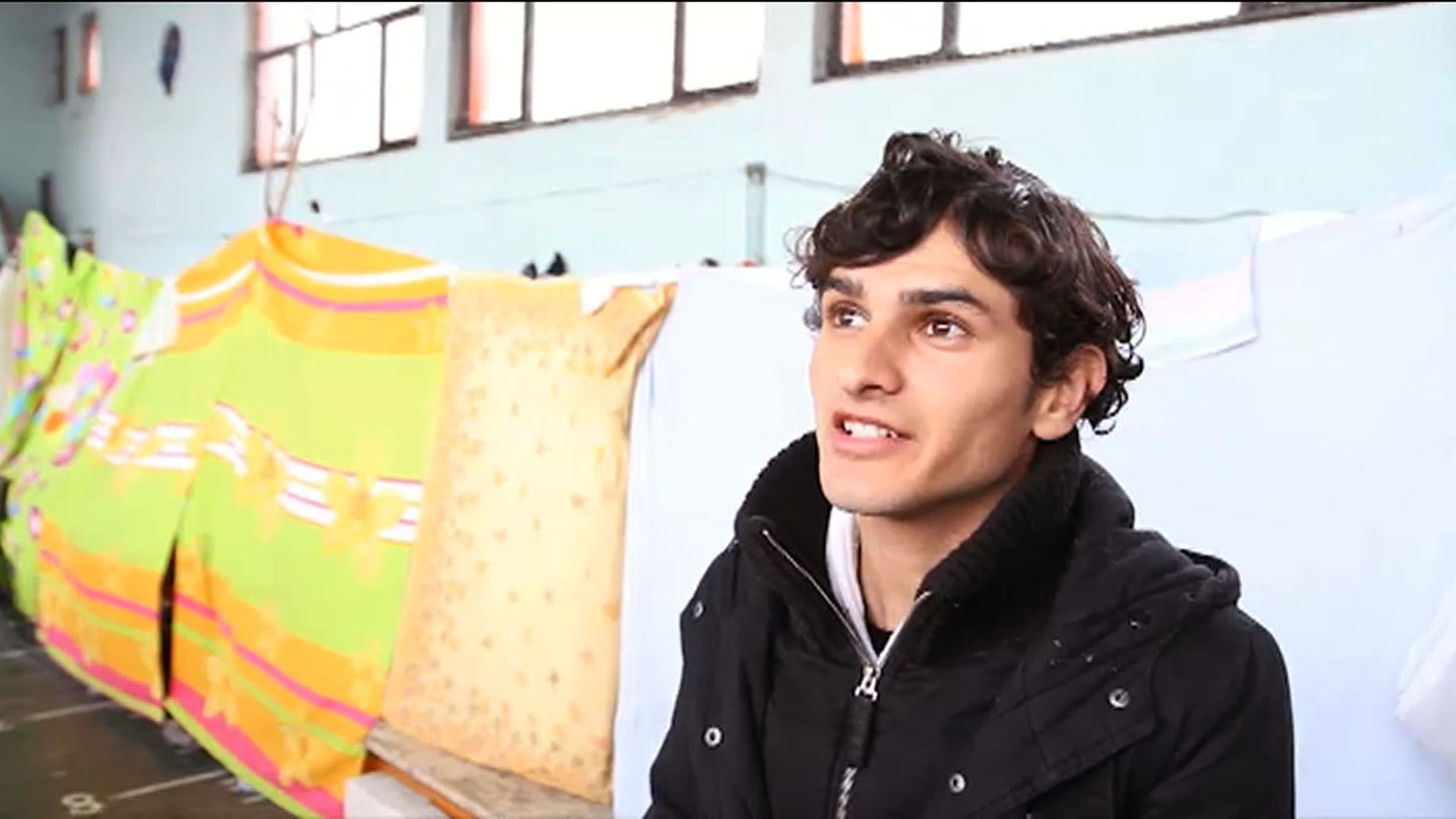Humanitarian crisis reaches Europe’s doorstep

This year, thousands of Syrian refugees have been arriving in Bulgaria, where they live in crowded and desperate conditions. With the government in Sofia unable to meet their needs, they depend on the help of organisations like the Swiss Red Cross.
When you pass through the gate of the former military compound of Harmanli, situated near the border with Turkey and now transformed into a huge refugee camp, two things strike you. One is the smell of burning wood that fills your nostrils and sticks to your clothing, and the other is a crowd of humanity of all ages and origins that wants something from you.
There are men from the Horn of Africa asking for food to cook on improvised barbecues. There are Afghans asking you when they will get the humanitarian papers enabling them to travel freely in Europe. And then there are the many children, almost all of them Syrian, who look you over and after a few seconds ask you to take their picture.
Winter under canvas
Not even the local Bulgarian authorities know the exact population of this refugee camp, but about 1,500 people seem to be living (or trying to live) here, all waiting to be registered.
Some of them find shelter in the brick structures that have not been used for years or maybe decades, with no glass in their windows and delapidated bathrooms, and where the powerful smell of mothballs used to preserve the newly distributed blankets gets into everything and makes your head spin.
More fortunate families have been assigned a container of a few square metres, where at least it is warm to sleep. But most of them are still living in unheated tents more suited to a summer weekend at a Mediterranean campground than to the freezing Bulgarian winter.

More
Daily life in a Bulgarian refugee camp
These are desperate people, mostly Syrians fleeing from an interminable war, but also young Afghans, Pakistanis, Iraqis and Malians who have crossed the border between Asia and Europe in search of work.
“To keep warm, we burn the wood we find, and at night when the temperature is low, we try to keep moving and walking around the tents so as not to die of cold,” says Rada, a Syrian of Kurdish origin who spent six days at a detention centre of the border police without even being able to wash.
This is a small and forgotten humanitarian crisis on Europe’s doorstep which the Bulgarian government seems unable to solve with its own resources. The political uncertainty that the country is currently experiencing does not help either, with a shaky coalition of very diverse parties, and demonstrations of students, artists and intellectuals which have gone on in front of the government buildings every day since June 14.
The spectre of political crisis and a snap election is always just around the corner.
International solidarity
The almost 12,000 immigrants who have arrived since the beginning of the year have been offered nothing but dire living conditions by the current government, led by Plamen Oresharsky, and there have been few responses to their asylum submissions.
But the members of the government seem to be agreed on one thing: building a cement wall 30 kilometres long which will seal off the unguarded border region and which is due to be completed by next spring.
Fortunately the machinery of international humanitarian aid has since geared up and has started distributing aid, following strong pressure from the UN Refugee Agency, which for several months has been denouncing the terrible living conditions in these centres. Associations of Bulgarian citizens and some NGOs have sprung up spontaneously.
Most importantly, the International Federation of Red Cross and Red Crescent Societies has stepped in. Through the Bulgarian Red Cross it has now made available a grant of CHF172,000 ($194,000). Another CHF250,000 has been given by the Swiss Red Cross to buy and distribute cooking utensils, toiletries, and children’s toys.
Following the humanitarian catastrophe in Syria, on September 4 the Swiss government announced that it would accept a quota of 500 refugees who are particularly vulnerable, outside of the asylumn procedure.
The criteria for family reunion were not limited – as is usually the case – to the nuclear family (spouses, and children up to 18 years of age), but were extended to brothers and sisters with their nuclear families, and other immediate kin.
In the space of less than three months, 719 Syrian citizens entered Switzerland, including 475 women and children, and a total of 1600 visas were issued.
The provision, which was designed with a minimum of formalities to facilitate a temporary stay in Switzerland for family members affected by the civil war, was cancelled on November 29.
The government explained that there had been “difficulties” in implementing the programme, in particular because of “the high number of requests for visas” (about 5,000) received by Swiss legations abroad.
Asylum in Switzerland more difficult
In a disused school at Voenna Rampa, situated on the outskirts of Sofia, 850 refugees live crowded in the assembly hall. More than a third are children, lovingly cared for by young Red Cross volunteers. They draw pictures together, play and laugh, seemingly carefree.
The adults, however, explain how difficult it is to live as a refugee in these conditions. Miriam, a Syrian woman with two children, sits on boxes and blankets. She talks about the cold that comes in through the windows. A man shows us the brown colour of the water that comes out of the taps of the few delapidated bathrooms.
“We drink this water,” he says, “and we have to give it to our children.” What will happen to these people over the coming months is as yet unclear. Those who have requested asylum will be eligible for a humanitarian visa and with it they can go to another country of the European Union.
Most would like to go to Germany, but some would like to go to Switzerland. Like Bazan, 22, a student in his last year of chemistry who has cousins there, even if he is not too sure where: “As soon as I get to Switzerland I’ll call them. I hope the country will take me, then I will be able to finish my studies.”
But what he does not know is that at the end of November the Swiss justice ministry revoked the special concession approved in September which allowed Syrians with relatives in Switzerland to join them with a temporary residence permit.
Bazan will have to come up with a different idea, at least for the time being. His request has come too late.
(Translated from Italian by Terence MacNamee)

In compliance with the JTI standards
More: SWI swissinfo.ch certified by the Journalism Trust Initiative
You can find an overview of ongoing debates with our journalists here. Please join us!
If you want to start a conversation about a topic raised in this article or want to report factual errors, email us at english@swissinfo.ch.